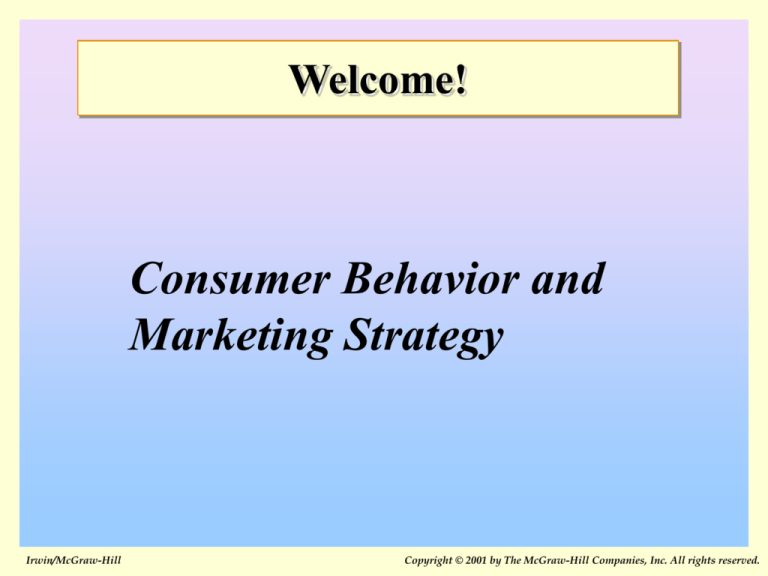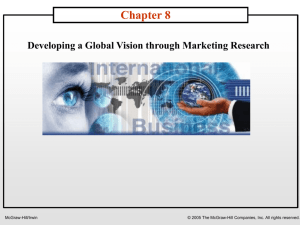
Welcome!
Consumer Behavior and
Marketing Strategy
Irwin/McGraw-Hill
Copyright © 2001 by The McGraw-Hill Companies, Inc. All rights reserved.
Why Study Consumer Behavior?
What is it?
Why is it useful?
Irwin/McGraw-Hill
What is Consumer Behavior?
80% of new products fail to meet financial expectations!!!!
Study of individuals, groups, or organizations and the processes used
to select, secure, use and dispose of products, services, experiences, or
ideas to satisfy needs and the impacts that these processes have on
consumers and society.
Answers the question of WHY?
Are managers telepathic? Do decisions regarding the 4 P’s just
come to them?
What are some commonly asked questions regarding consumer’s
behavior?
Irwin/McGraw-Hill
Commonly asked questions:
Product related:
What do they think of the product?
What do they think of competitor’s product?
How do you use the product?
What is their Aad /Aproduct?
Lifestyle related :
What are your hopes/dreams?
What is your place in the world? (role)
Irwin/McGraw-Hill
Applications of Consumer Behavior
Marketing strategy: MANAGERIAL RELEVANCE
Use common sense/ Look at successes and failures.
Regulatory Policy: Warning Labels/ Nutrition Labeling
Social Marketing/ TRUTH ads
Drug Use
HIV prevention
Irwin/McGraw-Hill
Marketing Strategy and Consumer Behavior
(Goal is creating and Reinforcing Customer Value)
1-1
Outcomes
Individual
Firm
Society
Consumer decision process
Problem Recognition
Information Search
Alternative Evaluation
Purchase
Use
Evaluation
Marketing strategy
Product, Price, Distribution,
Promotion, Service
Marketing segmentation
Identify product-related need sets
Group Customers with similar need sets
Describe each group
Select attractive segment(s) to target
Marketing analysis
Company
Competitors
Conditions
Consumers
Irwin/McGraw-Hill
Copyright © 2001 by The McGraw-Hill Companies, Inc. All rights
reserved.
Describe the Need Set
Irwin/McGraw-Hill
Market Segment Attractiveness Worksheet
1-2
Criterion
Score*
Segment size
Segment growth rate
Competitor strength
Customer satisfaction with existing products
Fit with company image
Fit with company objectives
Fit with company resources
Distribution available
Investment required
Stability/predictability
Cost to serve
Sustainable advantage available
Communications channels available
Risk
Other (_______________)
_______
_______
_______
_______
_______
_______
_______
_______
_______
_______
_______
_______
_______
_______
_______
*Score on a 1 to 10 scale, with 10 being most favorable.
Irwin/McGraw-Hill
Creating Satisfied Customers
1-3
Our total
Product
Physical Prod
+
Experience
Competitors’
total product
Irwin/McGraw-Hill
Consumer
decision
process
Superior
value
expected
Sales
Perceived
value
delivered
Customer
satisfaction
Copyright © 2001 by The McGraw-Hill Companies, Inc. All rights reserved.
Consumer Behavior is
Product—Person—Situation Specific
1-4
Personal
characteristics
Consumer
behavior
Product
characteristics
Marketing
strategy
Consumption
situation
Irwin/McGraw-Hill
Copyright © 2001 by The McGraw-Hill Companies, Inc. All rights
Overall Model of Consumer Behavior
1-5
EXTERNAL INFLUENCES
Culture
Subculture
Demographics
Social Status
Reference Groups
Family
Marketing Activities
INTERNAL INFLUENCES
Perception
Learning
Memory
Motives
Personality
Emotions
Attitudes
Irwin/McGraw-Hill
Experiences and Acquisitions
SITUATIONS
Problem
Recognition
Information
Search
SELF-CONCEPT
and
LIFESTYLE
Needs
Alternative Evaluation
and Selection
Desires
Outlet Selection
and Purchases
Postpurchase
Processes
Experiences and Acquisitions
SITUATIONS
Copyright © 2001 by The McGraw-Hill Companies, Inc. All rights






